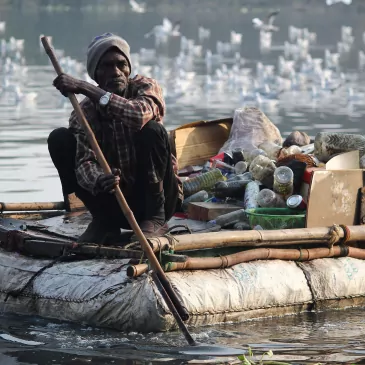Southeast Asian regions are some of the biggest worldwide agriculture producers, as well as the main areas responsible for biomass wastes, such as agricultural residues, wood biomass, animal waste and municipal solid waste, while also producing, millions of tonnes of single use plastics.
To tackle such waste head-on, Teysha Technologies has developed a patented chemistry platform that can be used to transform agriculture waste into a wide variety of sustainable packaging and construction materials.
In the southern Asiatic regions, including Thailand, Indonesia, Philippines and Vietnam, more than 38 million tonnes of rice husk and 34 million tonnes of bagasse are produced every year. Malaysia, Indonesia and Thailand are also responsible for producing more than 90% of global palm oil, which consequently causes 27 million tonnes of waste per annum from fruit bunches (EFBs), fibres, shells and liquid effluent.
Although Southern regions in Asia are major worldwide agriculture producers, farming practices are sometimes antiquated and often environmentally harmful. Every year, thousands of tonnes of biomasses, including stems, leaves and seed pods, are destroyed, waste from crops are commonly left in the field to decompose or – much worse – burned, causing approximately 13% of agricultural greenhouse gas emissions, according to a recent study in Science Direct.
This technique of burning agriculture waste is often referred to as slash-and-burn, which involves large fires and can greatly contribute to mass deforestation. This practice causes air pollution as many toxic gasses, such as methane, nitrogen oxide and ammonia are released in the atmosphere. Breathing these gases can in turn pose more health risks, such as the respiratory illness asthma, chronic bronchitis as well as eye and skin diseases.
In Indonesia, for example, agricultural businesses regularly use the slash and burn method to clear vegetation and waste from their land every year. Indonesia’s national disaster agency counted more than 328,724 hectares of land burnt from January to August 2019, which caused the closure of schools and offices as the haze reached very unhealthy levels on the Air Pollutants Index (API).
“Burning the agriculture waste destroys the quality of the soil. When crops are burnt, existing minerals and organic material are destroyed, such as the cellulose and the sugar from the trees, starch from tapioca, corn and wheat; and even coconut, palm, soy and rapeseed, all of which are potentially valuable natural resources” said Matthew Stone, Chairman at Teysha Technologies.
“Large multinational agricultural conglomerates often own and operate both upstream agricultural production and downstream manufacturing, packaging and distribution operations in Asia. Meaning, they are not only responsible for large scale agriculture waste, but also for the use of millions of tonnes of single use plastic every year in their product packaging, plastic which is polluting rivers and oceans at an unacceptable rate.
“In a 2015 report, the non-profit organisation Ocean Conservancy noted that 55-60% of plastic waste entering the world’s oceans comes from just five countries, including four in the region: China, Indonesia, the Philippines, Thailand and Vietnam. The debris kills marine life and breaks down into microparticles that make their way into the food chain.
China alone is responsible for producing 8.8 million metric tonnes of plastic waste that goes directly into our oceans. At this rate, according to the World Economic Forum report, there will be more plastic than fish in the ocean by 2050.
“Instead of using traditional petrochemical plastics in their production and distribution networks, large agriculture conglomerates could embrace new biopolymer technology and profit from their vast waste streams, while saving the planet from incessant pollution. Waste from common crops like sugar bagasse, tapioca, corn and wheat contain cellulose and starch, two natural raw materials that our chemical engineers can use to create a second generation of bioplastics and help reduce waste in a sustainable way.”
Teysha Technologies is an innovative UK company that has been making huge inroads into producing biopolymers from organic feedstocks. The versatile technology platform they have created is based on polymers derived entirely from natural feedstocks which can degrade in natural environments within a relatively short period of time. Most importantly, these polymers are a realistic substitute for existing petroleum-based polycarbonates.
“Teysha’s technology is a plug-and-play system that use monomers and co-monomers – also known as the natural building blocks that make up plastic – to create a polymer that works and functions like normal plastic,” explained Stone: “Instead of using hydrocarbon-based petrochemicals sourced from fossil fuels, Teysha uses natural sources such as starches and agricultural waste products.
“The positive aspect of this platform is that the physical, mechanical and chemical properties of the polymers can be tuned to make them usable in a wide variety of applications and materials.”
The strength, toughness, durability and longevity of Teysha Technologies’ polymers can suit multiple different uses. That means it’s possible to create either rigid or flexible materials, or even different polymers with different thermal properties. Most importantly, it is possible to control the biodegradation of the polymers, which means their breakdown can be effectively scheduled for within weeks or years. At the point of degradation, they will break down back to their basic natural building blocks, which is beneficial to the environment.
As the worldwide sustainably and plastic pollution policy changes rapidly, the Asian market needs new and effective strategies to make the best use of their abundant natural resources whilst protecting their rivers and oceans. Platforms like the ones created by Teysha can play a vital part in this sustainability mission.



